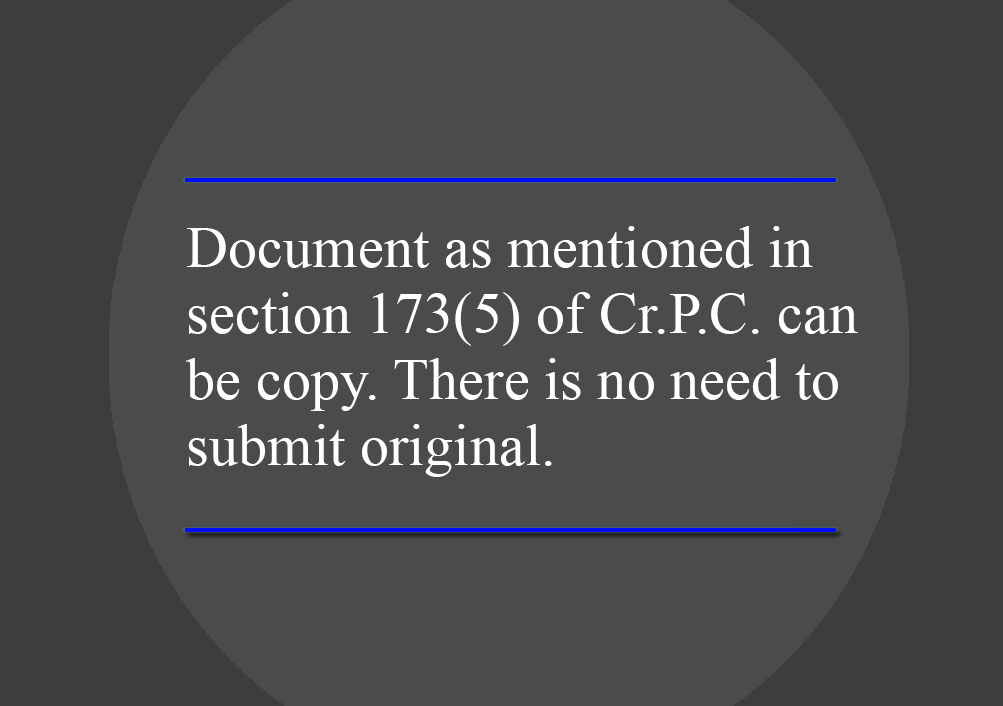Case Laws: Document as mentioned in section 173(5) of Cr.P.C can be copy and there is no need to submit the original.

1. Sudhakar Dinkar Malekar v. Hemu Prabhudas Thakur1
(High Court Of Judicature At Bombay) | 24-07-1981
In this case, question before the court was whether noncompliance with the provisions of Section 173(5)(a) and (b) and Section 207 of the Criminal Procedure Code affects the legality of the proceedings. By denying the application of the applicant, Court made the following observation:
“In the present case therefore, the mere fact that copies of the statements were not supplied to the accused persons before the case was committed to Sessions by the learned Magistrate as required by Section 207 of the Criminal Procedure Code, would not by itself, be sufficient to quash the proceedings. It is after all a question of prejudice and in the present case it is an admitted fact that the copies of the statements have been furnished to the accused. This case stands on the same footing as Narayan Raos case (supra) where the notes were destroyed by the police. After all the statements of witnesses under Section 161 of the Criminal Procedure Code are required to be recorded by the police, and the signature of such witnessses are not obtained on those: statements. They stand on the same, footing as the notes recorded by the police officers in Narayan Raos case (supra). Therefore, it is difficult for me to hold that merely because the original statements are to-day, not available, that prejudice has been caused to the accused.
16. In regard to the F.I.R. recorded under Section 154 of the Code, it is no doubt true that the original F.I.R. is not available, but its copy is available and it is furnished to the accused. It will be for the trial court to decide as to what would be the consequence of the original F.I.R. not being available, and whether secondary evidence could be led on that score, but the fact that the original F.I.R. is not available is not sufficient to quash the proceedings.”
1 https://www.legitquest.com/case/sudhakar-dinkar-malekar-v-hemu-prabhudas-thakur/17A3F6
2. Suresh Kumr Pathrella v. State through CBI2
(High Court of Delhi) | 13-09-2010
2 https://www.legitquest.com/case/suresh-kumr-pathrella-v-state-through-cbi/145DDA
In this case, petitioner contended that the prosecution-CBI has not filed original documents and therefore cognizance should not have been taken is also without merit and cannot be accepted. The High court of Delhi, on dismissing the petition observed as follows:-
“The court had taken cognizance and issued summons after filing of statements of witnesses and perusing the said statements. Photocopy of the documents were filed. It is not alleged that the charge sheet did not comply with Section 173(2) of the Code. Cognizance is taken on the basis of the police report and material submitted therewith. Section 190(1)(b) of the Code provides that the magistrate has power to take cognizance upon a police report of such facts as provided therein on being satisfied that it is a fit case for taking cognizance of the offence.”
3. SHIVHARI LOKHANDE v. PRABHA SINGH3
(High Court Of Madhya Pradesh) | 05-10-2016
In this case, it was vehemently argued by the petitioner that photocopies cannot be admitted as secondary evidence and there were manipulation in the cheque. To this, High court of Madhya Pradesh held as follows:-
“10. In the case of Aher Rama Gova v. State of Gujarat reported as AIR 1979 SC 1567, the Apex Court has held that “in a criminal proceeding, on proof of loss of original dying declaration, secondary evidence can be given by the prosecution”. This indicates that in criminal trial, when the original papers and the documents were missing, it was not a ground to quash the proceedings and the question whether the secondary evidence could be admitted was for the trial Court to decide with reference to the documents.
11. In case of State of Kerala v. Raju 1982 Cri.L.J. 304 (Kerala), it is held that even if the originals have not been produced as provided by Section 173(5) (b) of the Criminal Procedure Code, 1973 Section 65 of the Evidence Act is wide enough to enable the accused to use the copy delivered to him as secondary evidence for the purpose of contradicting the witnesses. It would be appropriate to clear it that under Section 65 of the Evidence Act, secondary evidence is admissible only of the existence of the contents of documents which is lost but the execution of the document must be proved by primary evidence as required by Section 67 read with Section 47 of the Evidence Act.
12. It is established that the original document was lost or that the party is not in a position to produce and it has been satisfactorily proved by the complainant/respondent, therefore, the provision of Section 65 (C) of the Evidence Act can be invoked. Hence, the order dated 09/09/2014 passed by the learned Fourth ASJ, Jabalpur calls for no interference.”
3 https://www.legitquest.com/case/shivhari-lokhande-v-prabha-singh/18F9A0
Sign up for our weekly newsletter to stay up to date on our product, events featured blog, special offer and all of the exciting things that take place here at Legitquest.




Add a Comment